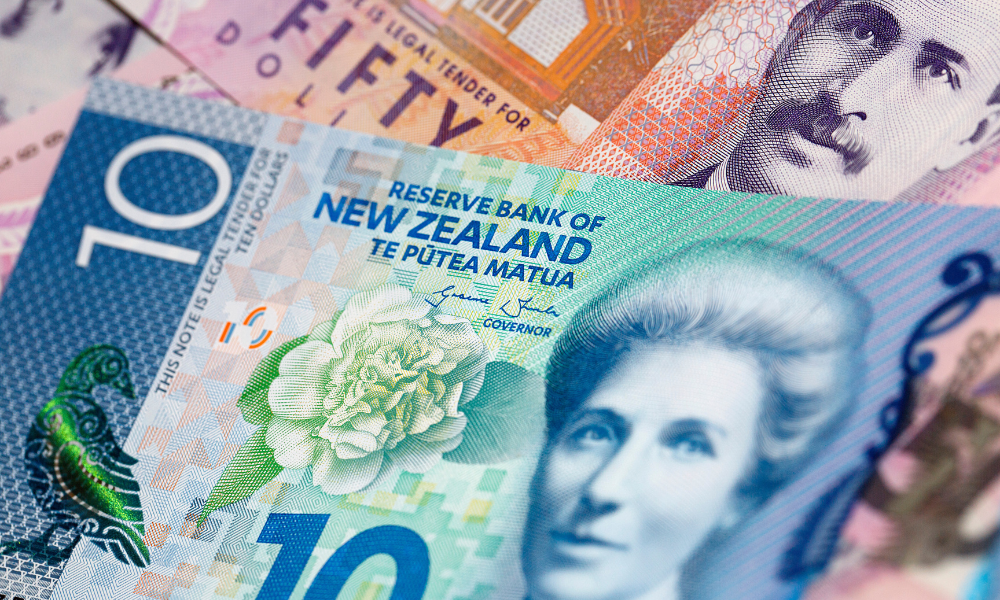The market awaits

The Reserve Bank of New Zealand (RBNZ) has cut the official cash rate (OCR).
In a widely-expected move, the nation's central bank slashed the OCR by 25 basis points to 3.50%, down from 3.75%, at its two-day monetary policy meeting this Tuesday and Wednesday.
"Economic activity in New Zealand has evolved largely as expected since the February Monetary Policy Statement," The RBNZ said in a statement. "Higher-than-expected export prices and a lower exchange rate have supported primary sector incomes and overall economic growth. While monetary restraint has been removed at pace, household spending and residential investment have remained weak.
"Having consumer price inflation close to the middle of its target band puts the Committee in the best position to respond to developments," the central bank continued. "As the extent and effect of tariff policies become clearer, the Committee has scope to lower the OCR further as appropriate. Future policy decisions will be determined by the outlook for inflationary pressure over the medium term."
The rate relief comes as a welcome change to many, particularly among mortgage holders and investors, many of whom have been straddled with turbulent economic conditions, including inflationary pressures, falling property prices and rising unemployment. Some economists have predicted that unemployment among Kiwis will rise from 5.1% in the December 2024 quarter, to as much as 5.6% during the current quarter.
Michael Gordon, a senior economist at Westpac NZ, said New Zealand's economy is headed towards a "subdued recovery."
"Firms remain optimistic about the year ahead," Gordon wrote in a note. "However, there remains a wide gap between firms’ hopes for the future and their performance to date. Recent performance has remained sluggish and a worrying resurgence in cost pressures is emerging. Firms continued to report that they are shedding workers and hiring intentions for the next quarter were about flat. Workers remain easy to find."
As a result, some would-be homeowners are playing it safe, waiting to buy while the nation's job security is still on the rocks.
On the flip side, Kiwis are enjoying lower interest rates and easing inflationary pressures. In January, the most recent quarterly consumer price index (CPI) revealed that inflation appears to be under control at 2.2%, for the quarter ending December 2024. The RBNZ has previously said it is targeting an inflation rate between 1% and 3%. The next CPI reading is set for April 17.
At the same time, the global market is navigating US President Donald Trump's sweeping international tariffs and their potential impacts. With Trump's most recent round of tariffs — what the US president has dubbed "liberation day tariffs" — an additional 10% levy will be applied to all New Zealand exports.
In 2024, New Zealand exports to the US were worth roughly $9 billion NZD, according to government agency Stats NZ.
"So the 10% additional tariff rate equates to a loss of export revenue of around $900 million [per annum], or 0.2% of GDP," Kelly Eckhold, chief economist at Westpac NZ, wrote in a note. "This is a fraction of the lift in export revenue that has been generated by the recent rally in dairy commodity prices…. The direct impact of the NZ tariffs is likely to be manageable for most exporters, albeit clearly not helpful."
The RBNZ said in its statement: "The recently announced increases in global trade barriers weaken the outlook for global economic activity. On balance, these developments create downside risks to the outlook for economic activity and inflation in New Zealand."
But even with the ongoing tariffs concerns, market players — including all of New Zealand's big banks: ANZ, ASB, BNZ, Kiwibank and Westpac — were optimistic that the RBNZ would reduce rates at its April meeting. Advisers have also reported increased levels of activity, both among first-time buyers and investors, thus far in 2025 with the lower rates.
"Both house sales and mortgage approvals point to increasing levels of housing activity, trending higher as mortgage rates have been lowered," Eckhold said. "House prices have increased only slightly as there remains a considerable stock of inventory on the market for demand to work through."
The RBNZ cut the OCR in February by 50 basis points to 3.75%, down from 4.25%. That equals a cumulative 175 basis point reduction in rates since August 2024.
The February rate cuts set off a wave of optimism in the market, with hopes that the bank would continue to trim rates throughout 2025. Former RBNZ Governor Adrian Orr confirmed the belief during his televised address in February, saying the bank would likely continue to reduce rates if inflation stayed within the bank's target range.
In March, Orr abruptly resigned. But economists agreed that the larger RBNZ committee would likely continue with its plans to decrease rates.
The RBNZ meets again on Tuesday, May 27 and Wednesday, May 28.



